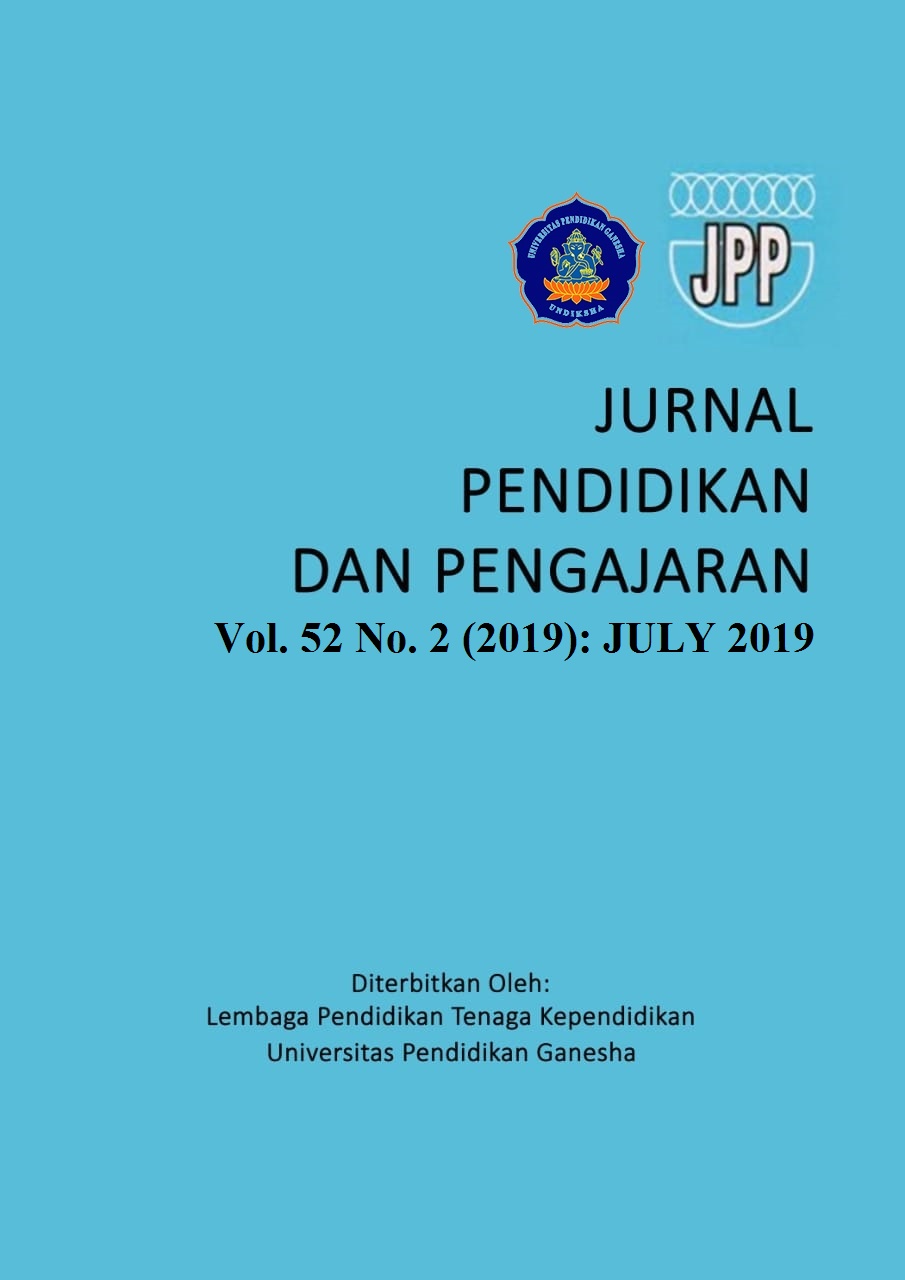Development of comic with discovery learning model as a media to increase students’ literacy in primary school
DOI:
https://doi.org/10.23887/jpp.v52i2.17883Keywords:
learning media, comic, discovery learning, literacy, primary schoolAbstract
The purpose of this study was to develop and test the validity, practicality, and effectiveness of comic media based on Discovery Learning in thematic learning in primary school. This research method is R & D and uses the ADDIE design which has 5 stages, namely Analysis, Design, Development, Implementation, and Evaluation. The validity of the module is analyzed using the expert test, the practicality of the product is seen from the student response questionnaire towards the media while the effectiveness of the module is analyzed using the results of analysis in accordance with the three aspects of literacy namely the process of understanding, reading goals, and reading behavior from the theme and comic books and paired-samples test t-test. The results of research on comic-based learning media with the Discovery Learning approach to improve the literacy of grade III elementary school students. Comics proved valid based on expert tests conducted. Evaluation of the media aspect validator obtained a score of 69 with a percentage of 92%. The material aspect validator got a score of 43 with a percentage of 86% and the learning aspect Validator got a score of 41 with a percentage of 82%. the comics proved to be practical based on the student questionnaire responses to the media, the researchers responded to give questionnaires to 35 grade III students obtained a percentage of 91%. Comics proved effective based on analysis of analysis results in accordance with the assessment of the three aspects of literacy, namely the process of understanding, reading goals, and reading attitudes from theme and comic books with an increase in reading theme books that obtained percentages from 80% to 92% after reading comics. an increase of 12%, and the results of the pretest and posttest at the significance level of 0,000. The average pretest was 62.89 while the posttest average was 86.34. Effectiveness can be seen from the increase in the number of students who achieve grades above the KKM. As many as 100% of students were declared complete at posttest while at pretest the number of students completed was 8.57%.
References
Ambaryani, A., & Airlanda, G. S. (2017). Pengembangan Media Komik Untuk Efektifitas Dan Meningkatkan Hasil Belajar Kognitif Materi Perubahan. Jurnal Pendidikan Surya Edukasi, 3(1), 19-28.
Annisa, N., & Simbolon, N. (2018). Pengembangan Media Pembelajaran Interaktif IPS Berbasis Model Guided Inquiry pada Materi Gaya di Kelas IV SD Negeri 101776 Sampali. School Educational Journal PGSD FIP UNIMED, 8(2), 217-229.
Balım, A. G. (2009). The Effects of Discovery Learning on Students’ Success and Inquiry Learning Skills. Egitim Arastirmalari-Eurasian Journal of Educational Research, 35, 1–20.
Behzadan, A. H., & Kamat, V. R. (2013). Enabling discovery ‐ based learning in construction using telepresent augmented reality. Automation in Construction, 33, 3–10. https://doi.org/10.1016/j.autcon.2012.09.003
Fahyuni, E. F., & Fauji, I. (2017). Pengembangan Komik Akidah Akhlak Untuk Meningkatkan Minat Baca dan Prestasi Belajar Siswa di Sekolah Dasar. Halaqa: Islamic Education Journal, 1(1), 17-26.
Gijlers, H., & Jong, T. De. (2005). The Relation between Prior Knowledge and Students ’ Collaborative Discovery Learning Processes. Journal of Research in Science Teaching, 42(3), 264–282. https://doi.org/10.1002/tea.20056
Honomichl, R. D., & Chen, Z. (2012). The role of guidance in children ’ s discovery learning. WIREs Cognitive Science, 3, 615–622. https://doi.org/10.1002/wcs.1199
In’am, A., & Hajar, S. (2017). Learning Geometry through Discovery Learning Using a Scientific Approach. International Journal of Instruction E-ISSN:, 10(1), 55–70.
Pitaloka, S. E. (2017). Pengembangan Media Komik Dengan Model Discovery Learning Untuk Mata Pelajaran PPKn Subtema Bumi Kelas 2. e-Jurnal Mitra Pendidikan, 1(5), 485-495.
Prasad, K. S. (2011). Learning mathematics by discovery. Academic Voices, 1(1), 31–33.
Rusman. (2017). Belajar dan Pembelajaran Berorientasi Standar Proses Pendidikan. Jakarta: Kencana.
Saab, N., Joolingen, W. R. Van, & Hout-wolters, B. H. A. M. Van. (2005). Communication in collaborative discovery learning. British Journal of Educational Psychology, 75, 603–621. https://doi.org/10.1348/000709905X42905
Tompo, B., Ahmad, A., & Muris, M. (2016). The Development of Discovery-Inquiry Learning Model to Reduce the Science Misconceptions of Junior High School Students. International Journal of Environmental and Science Education, 11(12), 5676–5686.
Tran, T., Noi, H., Nguyen, N., Noi, H., Bui, M., Noi, H., … An, N. (2014). Discovery Learning with the Help of the GeoGebra Dynamic Geometry Software. International Journal of Learning, Teaching and Educational Research, 7(1), 44–57.
Untari, M. F., & Saputra, A. A. (2016). Keefektifan Media Komik Terhadap Kemampuan Membaca Pemahaman Pada Siswa Kelas IV SD. Mimbar Sekolah Dasar, 3(1), 29-39.
Wahyudi, W., & Siswanti, M. C. (2015). Pengaruh Pendekatan Saintifik Melalui Model Discovery Learning dengan Permainan Terhadap Hasil Belajar Matematika Siswa Kelas 5 SD. Scholaria: Jurnal Pendidikan dan Kebudayaan , 5(3), 23-36.
Wakhyudin, H., & Permatasar, R. R. (2017). Pengembangan Media Komik Misugi Anaya Pembelajaran IPA Kelas III Materi Sumber Energi dan Kegunaannya. PSEJ (Pancasakti Science Education Journal), 2(2), 98-103.
Downloads
Published
How to Cite
Issue
Section
License
Authors who publish with Jurnal Pendidikan dan Pengajaran agree to the following terms:- Authors retain copyright and grant the journal the right of first publication with the work simultaneously licensed under a Creative Commons Attribution License (CC BY-SA 4.0) that allows others to share the work with an acknowledgment of the work's authorship and initial publication in this journal
- Authors are able to enter into separate, additional contractual arrangements for the non-exclusive distribution of the journal's published version of the work (e.g., post it to an institutional repository or publish it in a book), with an acknowledgment of its initial publication in this journal.
- Authors are permitted and encouraged to post their work online (e.g., in institutional repositories or on their website) prior to and during the submission process, as it can lead to productive exchanges, as well as earlier and greater citation of published work. (See The Effect of Open Access)





